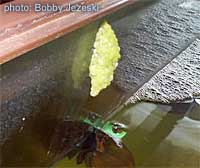(Reeve, 1856)
(Reeve, 1856)
|
The South American ampullarid Pomacea haustrum is classified under the canaliculata complex. This is a groups af very closely related species which are very variable in size and appearance.
Shell: Relatively large shell (9-12
cm heigth) with a dark green to brown base colour. The shell is also heavily
banded with dark-brown bands. Near the shell opening (aperture) the shell becomes
lighter in colour.
The suture is deeply indended, much like in Pomacea canaliculata
and Pomacea maculata. Compared with
Pomacea canaliculata, haustrum
has a less round and relatively higher shell.
Operculum: The operculum is moderately thick and corneous. The structure
is concentric with the nucleus near the centre of the shell. The operculum can
be retracted in the aperture (shell opening).
Body: The body has a grey-brownish colour with dark pigment spots. The
head is ligth in colour (nearly white), while the tentacles
and the siphon are well pigmented.
The siphon is very long when
fully extented. At rest, the siphon is still a tube, but is bended below the
shell.
Eggs: Green eggs, deposited in dense clutches on emergent vegetation (above the waterline).
 The bright green eggs of Pomacea haustrum. (picture not licenced under creative commons) |
|
Food: Eats almost all types of vegetation.
Behaviour: Most active during the night.
Habitat and distribution: Amazon region; Brasil: Para State; Rio Tapajoz;
Rio Manaron at Fonteboa and Tabatinga; Santrem, (Ilhé Grande Tapara and
Lago Grande do Javary; Lago Baptista (Olalla). Peru: Rio Ucayali; Cinco Copal,
(Agua Caliente, Pachita River, Huanaco). Bolivia: Amazon river.
Looks similar to:
Not surprizingly Pomacea haustrum is very similar to other members of
the canaliculata
complex. It can be hard to distinguish from Pomacea maculata
(Perry, 1810), Pomacea lineata (Spix,
1827), Pomacea sordida (Swainson, 1822),
Pomacea insularum (D'Orbigny, 1839)
(habitat: Parana, La Plata to Bolivia) and Pomacea canaliculata
(Lamarck, 1819).
|
Except where otherwise noted, this page is licensed under a Creative Commons Attribution-NonCommercial-ShareAlike 2.5 License . http://www.applesnail.net |
|